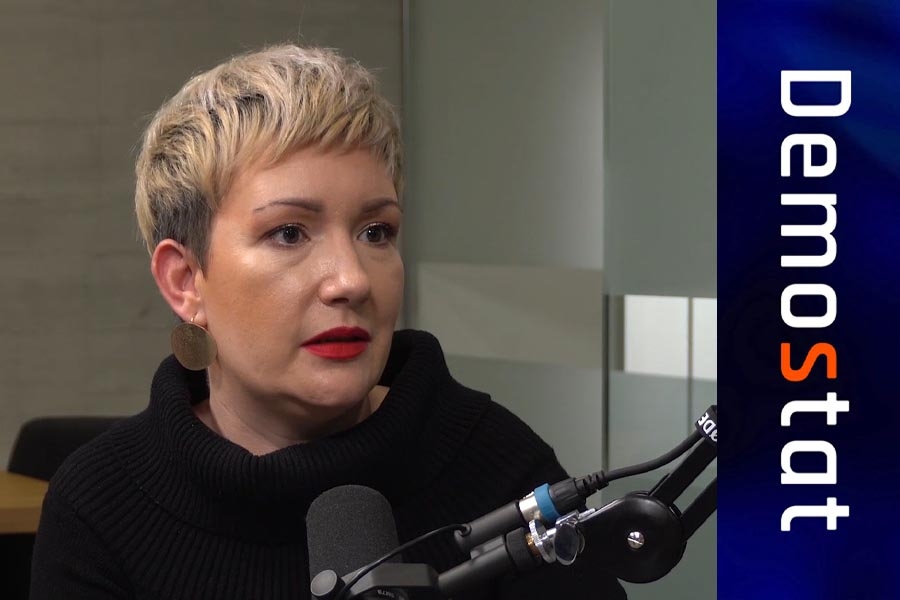Interests of political and financial groups are slipped to citizens through media content like cuckoo eggs. Citizens think they are receiving information, but not only are they getting misinformation, they are also exposed to dangerous content, which can significantly influence them to make wrong decisions, misled by others particular interests, says journalist Jovana Gligorijevic in the show "Half an Hour of Demostat". In the first episode of the new series of "Half an Hour" by Demostat, which discusses media literacy, Gligorijevic mentioned that political agendas in the media scene greatly influence how citizens get informed. The solution, she believes, lies in freeing the media from the shackles of particular political agendas and influences, although she adds that this may sound utopian since we have "stepped too deeply into it".

Interests of political and financial groups are slipped to citizens through media content like cuckoo eggs. Citizens think they are receiving information, but not only are they getting misinformation, they are also exposed to dangerous content, which can significantly influence them to make wrong decisions, misled by others particular interests, says journalist Jovana Gligorijevic in the show "Half an Hour of Demostat". In the first episode of the new series of "Half an Hour" by Demostat, which discusses media literacy, Gligorijevic mentioned that political agendas in the media scene greatly influence how citizens get informed. The solution, she believes, lies in freeing the media from the shackles of particular political agendas and influences, although she adds that this may sound utopian since we have "stepped too deeply into it".

Media literacy, according to UNESCOs definition, is a set of skills and knowledge that enable citizens to be citizens, not subjects, to influence changes in their micro-communities, as well as in societies and states, and to make their decisions and choices related to the common good well-informed, based on accurate and verified information, says Jovana Gligorijevic.
From the very definition of the term, it is evident that Serbias citizens are incapable of this, adds Gligorijevic.
Speaking about how much the media influence the level of media literacy of citizens, Gligorijevic says that one of the huge problems is the fact that there are political agendas in the media scene, due to which citizens get a distorted picture of reality.
“It is perfectly fine for any media to have an ideological or political orientation, to be left, right, liberally oriented in order to attract a target group that shares their values. However, agendas are the interests of certain political and financial groups, which are then passed on to citizens through media content like cuckoo eggs, and people think they have received information, but not only have they received disinformation, but also dangerous content that can significantly affect them to make wrong decisions, misled by others particular interests,” she stated.
The solution, which might sound like a cliché, a commonplace, or a utopia, is for the media to raise their heads and free themselves from the shackles of particular political agendas and influences, says the journalist.
Gligorijevic assesses that a mistake was made after the October 5th changes when a clearer line should have been drawn between the media scene and the new government.
“When we had Slobodan Milosevi?s regime in power, it was natural for opposition leaders, activists, and independent journalists to be on the same side, but the moment the opposition became the government, the line between the media scene and the government should have been drawn much clearer and it should have been stated more clearly - yes, until yesterday we were allies and friends, but now we must do journalistic work, to be critics of any government, not for the sake of criticism, but when it is founded and argued. Journalists must be guardians of the public interest,” she points out.
Asked whether the situation from 2000 to 2012 was better compared to the current one, Gligorijevic notes that now certain media have openly become a lever of the regime and that this has never been more pronounced, because agendas are no longer hidden.
However, she recalls that in 2003, the weekly Vreme was left without all advertisements from major advertisers because it offended a marketing agency close to the then government.
“All this already existed; only these have raised it to a higher level; it has become a cliché, but its true,” emphasizes Jovana Gligorijevic.
However, she notes that the unscrupulousness we now see has never been seen before and that we must fight against it.
“Here I stop believing in the possibility of conversion, enlightenment, and re-education, I think some sanction must exist. What kind and who will implement it, I don’t know. We have a self-regulatory body, the Press Council, but Dragan J. Vu?i?evi? comes to you and says that he does not recognize the code and from that moment on absolutely everything is allowed to him,” she states.
“We blame the young if they turn away from all this and go to TikTok, but I do it too, I go to TikTok and watch a man cook a sausage in a washing machine. On the one hand, you are uninformed and unnotified, and on the other hand, there is a founded suspicion that this is a direct consequence of being constantly overwhelmed with an excessive amount of statements, which are not necessarily all information and not necessarily all accurate, not to mention opinions and attitudes that revolve around us,” states Gligorijevic.
Jovana Gligorijevic is also the author of a manual for teachers on media literacy.
She notes that in the training of teachers and students, she mainly works with the interested part of society, with groups in which there are young people, teachers, high school and college students who are informed and have very developed critical thinking skills.
“But we must be aware that this is just a tiny part of a very heterogeneous group we call the youth, and its not exclusively the real picture on the ground. It is a real picture because they exist; we see that they organize themselves to take action, but that is not the whole picture. The same applies to professors and teachers,” she says.
Gligorijevic evaluates that a significant part of the problem lies in the media (il)literacy of journalists and editors.
Mentioning that she educates tabloid journalists about reporting on violence against women with her colleagues from the group "Journalists Against Violence," Gligorijevi? expresses dismay at the degree of ignorance and lack of knowledge of elementary principles of the profession, as well as the consequences arising from such reporting.
She highlights that the Code of Journalists of Serbia specifies how to report on gender-based violence, but a portion of journalists view their profession as a through-flow water heater, publishing tips as they receive them, thinking that this concludes their job.
Gligorijevic points out that the way editors work also represents a problem, as editorial interventions, which should involve correcting and improving content, actually lead to clickbait headlines and further degrade the content.
“We have encountered thousands and thousands of media contents over the years that are quite fine and not problematic, except in the part that relates to editorial work, the headline, and the visual aspect. It is the editors with whom we need to work, and if there is bad intention, it lies with the management and editorial team,” she said.
She recalls that the network "Journalists Against Violence" was established in 2017, starting with three members, and now includes 90 journalists, managers, influencers, freelancers, and photographers.
Every month, the group conducts an analysis of the entere content related to gender-based violence.
Asked whether there has been an improvement in the quality of reporting on violence against women, Gligorijevic notes that in the report for 2018, 60% of media content had a problem in reporting, while in the report for the period from 2019 to 2021, this number decreased to 40%, considering that an improvement of 20% is not small.
“Many journalists contact us when they need to report, either by sending an email to the addresses on the groups website or by contacting one of the group members. There is a good will in the media scene for reporting on gender-based violence to be better,” said Gligorijevic.
In all societies there are issues that are rather being skipped. Certain...
The neoliberal path, started in 2001, has led to especially bad results in Serbi...
For centuries, the region was subsumed within the Ottoman and Hungarian Empires,...
"Serbia has returned to the systemic and anti-systemic position of the political...
In reality, Serbia is closer than ever to NATO. In the course of the last five y...